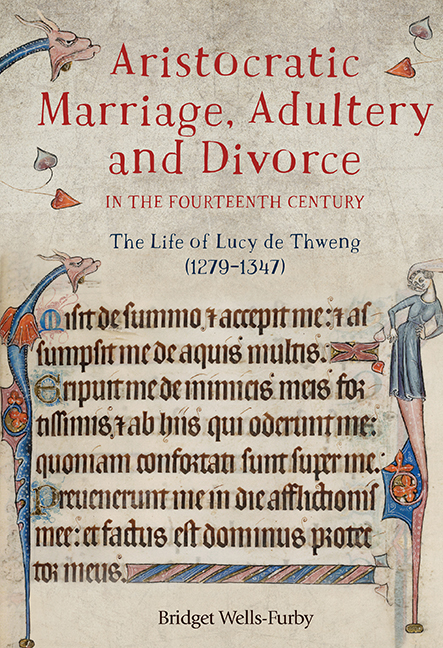 Aristocratic Marriage, Adultery and Divorce in the Fourteenth Century
Aristocratic Marriage, Adultery and Divorce in the Fourteenth Century Book contents
- Frontmatter
- Contents
- List of Illustrations
- Acknowledgements
- List of Abbreviations
- Note on the Text
- Introduction
- Map
- 1 Birth and Family; Inheritance and Disinheritance
- 2 Wardship and First Marriage
- 3 Separation and Divorce
- 4 Adultery and Fornication
- 5 Second Marriage
- 6 Widowhood
- 7 Third Marriage
- 8 Death
- Summary and Conclusions
- Bibliography
- Index
8 - Death
Published online by Cambridge University Press: 04 April 2019
- Frontmatter
- Contents
- List of Illustrations
- Acknowledgements
- List of Abbreviations
- Note on the Text
- Introduction
- Map
- 1 Birth and Family; Inheritance and Disinheritance
- 2 Wardship and First Marriage
- 3 Separation and Divorce
- 4 Adultery and Fornication
- 5 Second Marriage
- 6 Widowhood
- 7 Third Marriage
- 8 Death
- Summary and Conclusions
- Bibliography
- Index
Summary
Lucy died on 8 January 1347, aged sixty-seven, presumably at Brotton where she had made her will two days earlier. Wills made by men and widows are commonplace but the will of a married woman such as Lucy was comparatively unusual. This was due to the simple fact that, in normal circumstances, a wife had no possessions of her own, because everything belonged to her husband, and therefore she could have nothing to bequeath. The will of a married woman presupposes that her husband had given his permission for her to dispose of her personal items, and it is clear that this was not usually forthcoming. A selection of the early wills registered at York have been published and there are two hundred made in or before the year 1400. The vast majority of these are of men and, among the women, most are those of widows who were femmes sole and owned their own possessions. Only seven, including Lucy's, were made by wives. The very existence of Lucy's will is therefore a strong tribute to the nature of her relationship with Fanacourt.
It is quite short and comparatively simple. First, she commends her soul to God, the Virgin Mary and all the saints, in the conventional manner, and requests burial in Guisborough Priory, the traditional right of the patron. She leaves the choice of a mortuary to Bartholomew, and makes no reference to arrangements for her funeral, such as the weight of wax to be burnt or the number of paupers to be dressed to carry the candles. She makes ten personal bequests, all items of clothing. Her robe of cloth of gold, ‘with everything which goes with it’, was to go to her maid Alice ‘wife of Sarazin’, and another maid, Cecily, was to have a robe of bluet. Her chaplain Richard de Yafford was to have the better robe of medle, while two friars, Brother William de Foxton of the Dominicans and Brother John de Ellerton of the Franciscans, were to have robes of burnet and of mellee respectively. The other five beneficiaries were presumably members of her household. John le Baker was to have her winter robe and Master John Cook a courteby furred with miniver and a supertunic lined with sindon.
- Type
- Chapter
- Information
- Aristocratic Marriage, Adultery and Divorce in the Fourteenth CenturyThe Life of Lucy de Thweng (1279–1347), pp. 187 - 195Publisher: Boydell & BrewerPrint publication year: 2019
